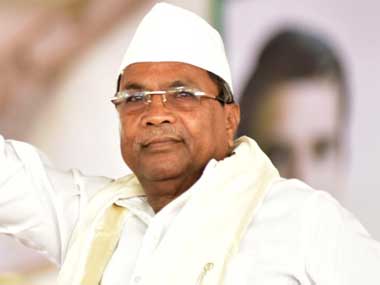Even as the keenly-watched Karnataka election of 2018 has drawn to a close, political maneuvering in its aftermath is far from over. The election ended up with a fractured mandate. However, after several political twists, BS Yeddyurappa was sworn in as the chief minister for the southern state on Thursday. Out of the 222 seats that went to polls, the BJP bagged 104 seats while Congress and Janata Dal (Secular) won 78 and 37 seats respectively. While the political slugfest is still underway in Karnataka over who finally gets to form the government (Yeddyurappa has 15 days to prove majority on the floor of the Assembly), Siddaramaiah has been missing in action since the day the results of the elections were announced. A man rooted in ‘Janata Parivar’ for two-and-a-half decades and earlier known for a strident anti-Congress stance, it has been a remarkable journey for former Karnataka chief minister Siddaramaiah. While the Karnataka poll results dealt a humiliating blow for the Congress leadership (the state was one of the last big bastions for the grand old party), the results have had an adverse effect on Siddaramaiah’s role in the state politics. [caption id=“attachment_4470677” align=“alignleft” width=“380”] File image of Siddaramaiah. Twitter/@siddaramaiah[/caption] Siddaramaiah, from the early 1980s to 2005, was a die-hard
anti-Congressman but his ouster from the JD(S) under the leadership of former prime minister HD Deve Gowda brought him to political crossroads. He joined the Congress in 2006. Apparently, Siddaramaiah was miffed with Deve Gowda for passing off the opportunity of catapulting him to a chief minister’s post when JD(S) and Congress formed a coalition government in 2004 after receiving a fractured mandate. N Dharam Singh was given the chief minister’s post and Siddaramaiah was appointed as the deputy chief minister. But that’s the past. Siddaramaiah successfully completed his tenure as the chief minister of Karnataka on 15 May, 2018, when he resigned from his post. Three or four hours into counting for the Karnataka Assembly election on 15 May, the BJP appeared set to claim a majority. The Congress and JD(S) quickly attempted to cobble together a post-poll alliance, much to the chagrin of the BJP. However, one man bore the brunt of the outcome more than the rest: Siddaramaiah, the now former chief minister. For example, in the press conference after the election results were announced on Tuesday, it was Karnataka Pradesh Congress Committee chief
G Parameshwara who addressed the media first and even when Siddaramaiah spoke, he just repeated the party’s stand. There was also that image of Congress and JD(S) leaders at the Raj Bhavan in Bengaluru in which Siddaramaiah was sitting away from Mallikarjun Kharge, HD Kumaraswamy and Ghulam Nabi Azad, while Kumaraswamy was in a discussion with Azad. Congress’ habit of sidelining its chief ministers or prominent local leaders after an electoral defeat is not a new one. After the Meghalaya elections in which NDA ally National People’s Party (NPP) bagged 19 seats and formed the government with the support of MLAs of other regional parties, former Congress chief minister Mukul Sangma implied that he took responsibility for the defeat when he said, “I wish I could have done more”
when he was asked whether he had any regrets. On the other hand, Congress chief Rahul Gandhi simply
accused BJP of “usurping” power through proxy in Meghalaya. After the Himachal Pradesh elections in 2017 too, it was outgoing Congress chief minister Virbhadra Singh who took moral responsibility for the defeat. “I accept BJP’s victory and take full responsibility of our performance here,” Singh
had said after the defeat. In fact, according to PTI, the knives were out for Singh from younger leaders such as state Congress chief Sukhvinder Singh Sukhu even before the polls. But Congress could not afford to sideline Singh because of his
continuing popularity in the hill state. Of course, it has to be noted that due credit was also given to Amarinder Singh after Congress won the elections in Punjab in 2017. But despite a series of electoral defeats, the national-level leaders of the Congress have largely been absolved of responsibility, despite actively campaigning for many of these elections. In fact, after the party’s debacle in Uttar Pradesh, UP Congress chief Raj Babbar directly said that Rahul Gandhi was not responsible for the defeat. “Congress has won three of the five states where elections were held and this goes on to prove that Rahul Gandhi was successful in his mission,”
PTI had quoted him as saying. Babbar even took responsibility for the defeat. “As president of the state party unit, I take all the responsibility for the defeat.” After the Assam election defeat for Congress in May 2016, the party
sidelined former Chief Minister Tarun Gogoi by approving the name of Debabrata Saikia as leader of the Congress Legislature Party in Assam. In February this year, veteran Congress leader and former Delhi chief minister Sheila Dikshit even admitted that
the top leadership of the party had “ignored” her for a long time. “I do what I am told. I belong to Congress and the Congress is my party. I can do anything for Congress. They ignored me for years but I never complained,” she had said. Thus, one of the major political trends which the Karnataka polls have confirmed is that Congress has a habit of sidelining or making a scapegoat out of its significant local leaders while its national-level leaders are rarely seen making remarks about taking responsibility for electoral defeats. With inputs from PTI
One man bore the brunt of the Karnataka poll outcome more than the rest: Siddaramaiah, the now former chief minister.
Advertisement
End of Article


)
)
)
)
)
)
)
)
)



